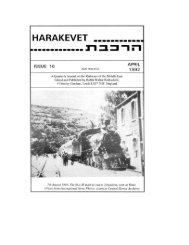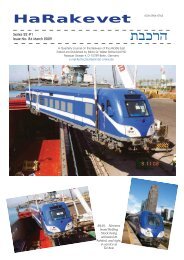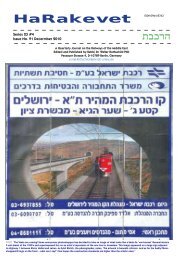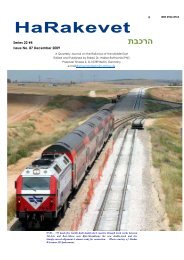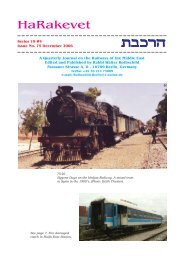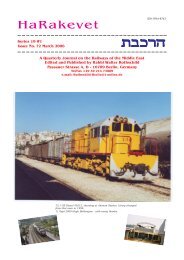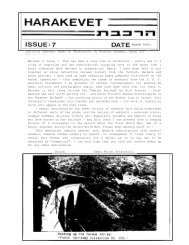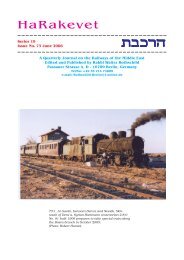Create successful ePaper yourself
Turn your PDF publications into a flip-book with our unique Google optimized e-Paper software.
Toll Highway No. 6 southwards between Lehavim<br />
road junction (near Lehavim -Rahat railway<br />
station) and Sha'ar HaNegev (Negev Gate), a total<br />
length of 45 km. In addition a double-track railway<br />
is to be built parallel to the highway, both of which<br />
bypass Beer-Sheva to the east. This will be the first<br />
section of the future line to Eilat on the Red Sea,<br />
and will provide easy access both by private car<br />
and public transport to the local population." This<br />
approved plan is part of an overall plan for building<br />
more roads and railways all over Israel. [But see<br />
below.]<br />
(vi) . GRADE SEPARATIONS.<br />
From an Isra-Rail press release of<br />
05.01.2010:-<br />
"The railways continue to invest in<br />
safety measures for the benefit both of train<br />
passengers and car drivers. One element of this is<br />
the intensive construction of grade separations - the<br />
latest was opened<br />
on 30.12.2009 at the settlement of Beit<br />
Gamliel (between Rehovot and Yavne East),<br />
replacing Level Crossing Nos. 144 & 145.<br />
The $16.3M project included building<br />
an overhead 150m-long road bridge over the line as<br />
well as over the parallel Road No. 410, widening of<br />
Road 410 over 900 metres, building a 1km. long<br />
access road to the nearby Industrial Zone and<br />
re-arranging the junction at its entrance to Road<br />
410, building a pedestrian ramp over the railway<br />
and Road 410, building a 40m-long railway bridge<br />
over Gamliel Creek, reinforced walls at the access<br />
ramps to the main bridge as well as along the<br />
access road to the industrial zone, lighting,<br />
landscaping and landscape development as part of<br />
a national infrastructures project."<br />
(vii) . RECYCLING.<br />
From a press release of 10.01.2010:-<br />
"The Railways are currently<br />
deepening their environmental<br />
commitment by increasing the use of recycled<br />
materials and bringing this subject up for public<br />
discussion. On 04.01.2010 a conference was held<br />
by the Infrastructure Dept., at which the emphasis<br />
was on keeping the environment 'green' and clean<br />
by using existing materials, and reducing damage<br />
to natural and national resources. Participants<br />
included representatives of the Environment<br />
Protection Ministry, National Roads Co., Institute<br />
of Standards, laboratories, project managers,<br />
designers, soil and land consultants."<br />
Mr. Uri Tal, co-ordinator of solid waste<br />
materials in the Environment Protection Ministry,<br />
gave a presentation on integrating the use of<br />
recycled materials in the railways; Dr. Arkadi<br />
Rabinovich, engineering manager of the<br />
Infrastructures Dept., spoke on using such<br />
materials in the infrastructure. The President of the<br />
Recycling Subcontractors Forum, Mr. Tzvika<br />
David, and head of the Standardisation<br />
Committee Prof. Ilan Yishai also spoke.<br />
The railways are currently using<br />
recycled materials in various ways; ballast no<br />
longer suitable for track is being used in ditches;<br />
rails are being re-used, concrete slepeers are being<br />
crushed, the steel parts separated and then the<br />
crushed concrete is milled and distributed in<br />
ditches. In addition containers for collecting<br />
recyclable paper, plastic and metal containers have<br />
been put in place at all stations and work sites."<br />
(viii) . MORE WORKS ON BEER-SHEVA<br />
LINE.<br />
Due to further infrastructure works in<br />
connection with double-tracking on the line to<br />
Beer Sheva, there were to be no services between<br />
Kiryat Gat and Beer-Sheva on Saturday night<br />
16.01.2010, traffic returning to normal the next<br />
day. The works include activating the signalling<br />
for the double-track section between Ahuzam and<br />
Tel Nagila; closing Tel Nagila station for<br />
upgrading, and activating two radar systems, one at<br />
Teufa South and the other at Lod level crossings.<br />
Consequently train services would terminate at<br />
Kiryat Gat.<br />
(ix) . MORE ROLLING STOCK ORDERS<br />
AFTER ALL.<br />
From an IR press release of 19.01.10:<br />
The״ Railways' Higher Tenders Committee<br />
approved on 14.01.10 the activation of the<br />
emergency purchasing option for new single-deck<br />
push/pull train coaches - a total of 27 trailers and 4<br />
power cars/driving trailers, at an overall cost of<br />
46M Euros. The order is placed on Siemens<br />
Transportation by exercising an option in the initial<br />
agreement - Siemens being currently the only<br />
rolling-stock manufacturer with such an option.<br />
This ,emergency purchasing' is to<br />
provide the additional rolling stock needed for the<br />
new line to be opened in 2011 between Tel Aviv<br />
and Rishon-Le-Tzion West, with stations in Holon<br />
and Bat-Yam, where tens of thouands of daily<br />
commuters will be added to the already-growing<br />
passenger traffic. The agreement was signed after a<br />
public tender had been published and after some<br />
tough negotiating (which was even suspended at<br />
one point) regarding delivery dates, including the<br />
increasing of penalties for late deliveries. In the<br />
end a compromise was agreed upon, according to<br />
which the penalties will be modular, which means<br />
that the majority would be paid by Siemens if the<br />
power cars are delivered in longer than nineteen<br />
months, whilst the penalties for the trailer cars will<br />
be smaller. In addition the railways agreed to be<br />
more flexible regarding the delivery schedule of<br />
the trailer cars, to be between 19 and 24 months."<br />
(The reason for this is that the reduction of the<br />
existing trains from 10 to 9 cars, due to the inability<br />
of the Vossloh locos to haul ten coaches, means<br />
that there is a current surplus of trailer coaches but<br />
a shortage of driving trailers.) The deal also<br />
includes a requirement to deal finally with the<br />
various technical difficulties which have arisen<br />
with the trains already supplied. This emergency<br />
purchase is in addition to the tenders already<br />
published for 60 double-deck coaches and 15<br />
double-deck driving trailers.<br />
On 12.03.2010 came a further press<br />
release:-<br />
The״ Israel Railways has granted<br />
Siemens an order worth millions. The German firm<br />
will build 31 passenger coaches with a total value<br />
of 47M Euros.<br />
Four years ago the Siemens subsidiary<br />
Siemens-Mobility achieved its first order; at that<br />
time IR ordered 87 coaches with an option for a<br />
further 585 coaches; the new order effectively<br />
consists of the first tranche of this option; they are<br />
the type ,Viaggio Light' and are intended for use<br />
between Tel Aviv and Rishon leTzion. The<br />
contract was signed this Tuesday.<br />
The״ contract confirms the good<br />
cooperation with the Israeli State Railways" said<br />
Hans-Joerg Grundmann, the head of Siemens<br />
Mobility. He was a member of an Industrial<br />
Delegation which went with Minister Ramsauer to<br />
Israel. The Viaggio Light is a low-floor carriage,<br />
that can be used in Israel not just for local but also<br />
for intercity traffic. The carriages will be produced<br />
in the Siemens works in Vienna."<br />
In a later comment - it appears that the<br />
Chinese company CNR is currently not in the game<br />
for the provision of double-deck coaches;<br />
meanwhile IR has clarified that for those<br />
manufacturers who will be ready to provide<br />
maintenance facilities for seven to ten years, the<br />
number of double-deck cars would rise from 74 to<br />
122, and of diesel-electric locomotives from 15 to<br />
22.<br />
(x). COLLECTIVE LABOUR AGREEMENT.<br />
From an IR press release of 28.01.10:<br />
"Mr. Yitzak Harel today signed a new collective<br />
labour agreement with the employees' Works<br />
Committee; this raises all wages by 4%, plus an<br />
additional 2% for improving the employment<br />
conditions of the 'Second Generation' staff - those<br />
who joined the railways from 2003. This will<br />
reduce the gap between their conditions and those<br />
of more veteran workers. Additionally about 100<br />
development and infrastructure employees,<br />
working under a personal labour agreement, have<br />
been transferred to the collective labour agreement,<br />
taking into account their professional experience as<br />
technicians.<br />
The new agreement is a significant<br />
achievement for both the management and the<br />
employees - it is the first one since 2003, when the<br />
Railways' status changed from State-owned to a<br />
Government Company; in this period the number<br />
of employees did not<br />
Page 4 הרכבת



